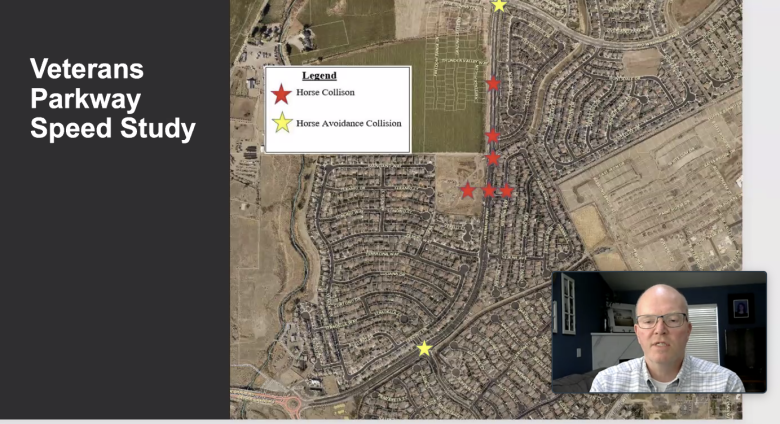Hundreds of acres of new housing developments in southeast Reno are contributing to increasingly dangerous conditions for feral horses occupying the Virginia Range.
Dozens — officials said they don’t have an exact count — of collisions between motorists and horses in the area have occurred in the past three years.
“Some of you may be aware that in the last three years about 25 horses were hit by drivers, causing great damage to vehicles and unfortunately death to horses,” said Reno Councilmember Naomi Duerr during a virtual meeting held last night to discuss public safety concerns involving the free-roaming horses.
New homes being built will further push horses off habitat where they roam. Officials are exploring new lighting, speed reductions, wildlife crossings and warning signs to reduce horse-vehicle collisions.
City of Reno planner Brooklyn Oswald said a handful of developments will need miles of fencing to keep horses off hundreds of acres. The massive Daybreak development – renamed Talus Valley in 2021 – he said, is responsible for preventing horses off nearly 1,000 acres where 4,000 homes will be built.
“About 4,000 homes will be going in that area,” he said. “They have about two miles of property that abuts the Virginia Range, and they were required through the PUD handbook to fence that prior to any construction happening.”
The development also has to limit turf grass in order to not attract horses.
“Additionally, one of the big things we put on that is that the Daybreak [homeowners association] is responsible to maintain and fix [two miles of] fence, so we’re taking that burden off the [horse] advocates and that is going over to the HOA,” Oswald added.

Fencing and cattle guards are problematic. Cattle guards are loud and fences and gates are being vandalized.
“One of the things we are seeing is a tremendous amount of vandalism from either running into the gates, removing the gates, cutting the wire, moving through the wire…” he said. “That’s why we’re moving to the more the stronger fences … on the next project.”
The Virginia Range horses are considered feral-estray because the Bureau of Land Management declared the area free of wild horses in the 1980s. Any horses now on the range are legally called estray livestock but with no defined owner.
The Nevada Department of Agriculture, which did not take part in last night’s discussion, has legal jurisdiction over feral livestock. A cooperative agreement with horse advocates, however, means the horses are being managed by the Wild Horse Connection nonprofit and volunteers.
More than 500 calls were reported to NDA about horse concerns in the current fiscal year. It also reported 27 collisions to NDA in 2021 — it reported 46 crashes in 2020. Many of those were in the Dayton area along U.S. Highway 50.
“Due to horses straying from outside the boundaries of the Virginia Range area in Fernley, WHC is working with city, county, and state agencies to relocate the horses back within the boundaries, as well as future preventative fencing projects,” a state report from March noted.
The nonprofit darts horses to reduce reproduction. It also conducts diversionary feeding in an attempt to keep horses away from roads.
Duerr said the city is going to be partnering with Washoe County and land owners to better coordinate public safety concerns involving horses.

